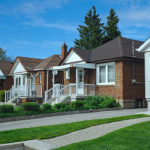AESC Engineering Expertise
Energy Audits and Assessments
AESC's Audit Process
AESC kicks off each audit by engaging with our customers to understand their goals and objectives, audit drivers, specific pain points and opportunities for focus, and to gather site data and coordinate the site visit.
Before visiting your site, our engineers will use our software to analyze utility billing history and usage trends, identify potential system or operational issues, and to visualize the site to inform the audit approach.
During the site visit, AESC will collect site and system data utilizing standardized data collection processes, including photographs and measurements, which may depend on the level of audit requested.
Should COVID restrictions, budget requirements, or other needs necessitate remote audits, AESC can easily accommodate such a request, leveraging a combination of our remote audit software, aerial photography resources, operator interviews and remote access to building operating systems, if possible, for identification of optimization opportunities.
Through preliminary engineering and economic analysis, AESC will develop and review an initial measure list to review with the customer to confirm interest and viability before proceeding to the detailed measure analysis.
AESC will perform detailed energy, GHG, non-energy benefits, cost savings and implementation cost analysis for measures, resulting in a ranked list of measures that best meet client objectives.
Recommended no cost, low cost and investment grade measures are summarized in rank order and described to support customer understanding and action. Available rebates, incentives and grants will be listed and incorporated, where possible. Reports go through a rigorous technical and non-technical internal quality control review before delivery and presentation to the customer.
AESC will present audit results to the customer in person or via an online meeting to facilitate discussion, answer questions, and support implementation.
AESC's Energy Audit Specialties
ASHRAE Level I, II, and III Audits: ASHRAE sets the standard for three levels of energy assessments, depending on customer budget and need. AESC can help you determine what level is right for you.
IAC-equivalent Assessments: AESC is a U.S. Department of Energy-qualified IAC-equivalent Assessment provider, an assessment that allows small manufacturers and wastewater treatment plants to unlock $300,000 in implementation grants for projects that improve energy, productivity or reduce GHG or pollution. Find out if you are qualified and how AESC can help you capture these funds. Read the announcement.
Electrification Assessments: AESC can provide audits focused on decarbonization opportunities, including how to replace fossil fuel-based systems with lower carbon electric systems, such as heat pumps, heat pump water heaters, electric appliances and equipment, and other systems.
Benchmarking and Building Energy Performance Standard (BEPS) Audits: Our licensed and qualified energy engineers perform cost-effective audit and assessment services that can include efficiency, electrification, load flexibility, and renewables/resiliency opportunities. Audits prioritize the operational and capital projects to help you meet your reduction targets, with a focus on your asset priorities, and include energy, carbon, water, cost savings data and return on investment analysis. Find out more about our BEPS Compliance Services.
Power Resiliency Assessments: Power resiliency assessments analyze a facility’s ability to provide self-generation, energy storage, and building operational strategies to keep the facility powered during a short term or longer-term grid outage that may be caused by climate events, grid emergencies and other power system shutoffs. The assessment identifies client and facility resiliency needs (e.g. hours of backup power desired), identifies critical loads, and identifies solution options and implementation cost estimates to meet requirements. AESC performs a range of resiliency assessment services, from remote portfolio analysis and prioritization to detailed on-site analysis, system design and costing.
AESC engineers can assess systems and technologies including:
- Electrification and decarbonization potential: Including air to water heat pumps, heat pump domestic hot water heaters, geothermal heat pumps, air source heat pumps, induction cooking, and heat pump clothes dryers
- Lighting and controls
- HVAC systems and controls: Including retrofits, repairs, and RCx
- Building automation systems (BAS)
- Industrial and manufacturing systems: water/wastewater, compressed air, heat recovery, motors/pumps/drives, refrigeration, and steam
- Building envelope: Including fenestrations and building shading
- Roofs: Age, condition, and potential for cool roofs
- Solar and battery storage potential
- Plug loads
- Equipment repair and operational adjustments
- Water conservation equipment: Low flow plumbing fixtures, irrigation controls, etc.
- Associated infrastructure and envelope improvement: Including upgrades to accommodate electrification and health and safety measures



